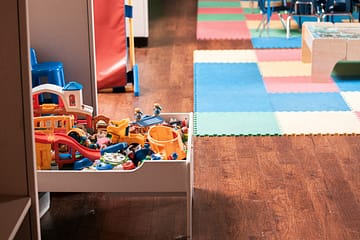The toy department might be intimidating with all of the colourful plastic doodads and bold marketing claims. Take a deep breath—going green does not have to be difficult. In this post, we’ll go over things to look for when buying sustainable items for your children. You’ll discover secret strategies for shopping smarter, such as reading labels and identifying long-lasting materials. With a few simple rules, you can quickly identify really eco-friendly options and fill your home with safe, ethically created toys. Sustainability is not only a buzzword. It’s a call to action for more responsible consumers and global citizens. Every decision we make, from what toys we buy to what school supplies we pick, has an influence on the environment.
A Value-Driven Approach
What is driving the eco-awakening? Many people prioritize purchasing items that reflect their underlying values and views. They seek to help businesses take active efforts to lessen their environmental impact and create a better future. At the same time, there is growing concern over greenwashing – false marketing that exaggerates eco-friendly promises. Savvy consumers are doing their homework, seeking openness and honesty from companies.
Developing Long-Term Habits
Perhaps most significantly, incorporating sustainable behaviours early on can establish lifetime habits. As children get older, making environmentally beneficial decisions becomes second nature. Those formative encounters may instil a lifelong desire to safeguard the environment. It is apparent that eco-awareness is growing among parents and educators. The urge to create a greener, cleaner environment for children is as strong as ever. And that’s great news for the world we all share.
The Importance of Eco-Friendly Toys
Reducing the Environmental Impact:
Conventional toys are frequently composed of plastic and other non-biodegradable materials. This means they will remain in landfills for centuries, damaging the air, water, and soil. Eco-friendly toys, on the other hand, are constructed of sustainable resources such as wood, organic cotton, and recycled plastic. They have a far less carbon footprint and will not contribute to environmental damage. So, by selecting green toys, you’re making the planet a little better for your children.
Safer for little ones:
Eco-toys are not only environmentally beneficial, but also safer for your child’s health. Many traditional plastics include toxic chemicals such as BPA, phthalates, and PVC. These are harmful if consumed and may affect hormones. Natural toys do not include any of these harmful substances. Non-toxic, hypoallergenic materials include wood, cotton, and plant-based polymers. This makes them a better option, particularly for new-borns who enjoy putting everything in their mouths!
Built to last:
High-quality wooden toys, for example, may resist years of hard play and last through several children. This cuts waste and saves money in the long term. Cheap plastic toys, on the other hand, are prone to breaking and must be replaced frequently. Choosing well-made, sustainable toys is an investment that will grow with your child. Plus, you can pass them down as family treasures someday!
Recommended Eco-Friendly Toys and Brands
The Eco-Friendly Toy Revolution:
Whether you’re searching for instructive games, creative arts and crafts, or soft plush toys, there are lots of green alternatives produced from renewable materials such as bamboo, organic cotton, and recycled plastic. What is the best part? These toys frequently inspire imaginative free play while also teaching young children about environmental responsibility.
Brands are leading the charge:
Several pioneering firms are laying the groundwork for a more sustainable toy sector. Plan Toys makes lovely wooden toys out of recycled rubberwood, whereas Green Toys makes colourful, long-lasting toys out of recycled milk jugs that are free of BPA and phthalates. Hazelnut Kids sells stuffed animals manufactured from organic materials and filled with recyclable filling. Explore the whimsical world of Lua, whose open-ended play scenarios and materials such as cork stimulate creativity and environmental stewardship.
Tips for Selecting Eco-Friendly Toys
Research Ethical Brands:
When it comes to choosing sustainable toys, researching brands is essential. Look for firms that prioritize ethical production and use environmentally friendly products. Many businesses are increasingly highlighting their environmental activities prominently on their websites.
Opt for natural materials:
Avoid plastic toys that are packed with toxins. Instead, choose natural materials such as wood, cotton, wool, bamboo, or recycled plastic. These are safer for children and the environment. Wooden toys are long-lasting classics that may be passed down through generations.
Check for certifications:
Keep an eye out for reputable third-party certifications that confirm a toy’s environmental friendliness. The Forest Stewardship Council (FSC) certification assures that timber is supplied sustainably. The Global Organic Textile Standard (GOTS) assures that organic fabrics do not contain hazardous colours or pesticides.
Buy local and handmade:
Purchasing handcrafted toys helps to support the local economy and artists. You’ll often discover one-of-a-kind, high-quality products made with care from sustainable materials. Furthermore, shopping locally reduces emissions from shipping.
Why Choose Sustainable Toys?
Eco-friendly materials:
When it comes to toys for your children, choosing sustainable solutions is a good decision. Eco-friendly toys are composed of natural, renewable materials such as wood, organic cotton, or recycled plastic. This means that they have a smaller environmental effect than traditional toys constructed from non-renewable materials.
Reduce plastic waste:
Plastic toys contain hazardous chemicals such as BPA and phthalates, leading to pollution and health risks. Sustainable toys use less plastic, which helps to reduce the vast volumes of plastic trash that end up in landfills and seas every year. Your child’s pastime becomes more environmentally friendly.
Support Ethical Practices:
Purchasing sustainable toys encourages firms that follow to ethical production techniques and fair labour policies. By purchasing their items, you are voting with your wallet for positive change.


